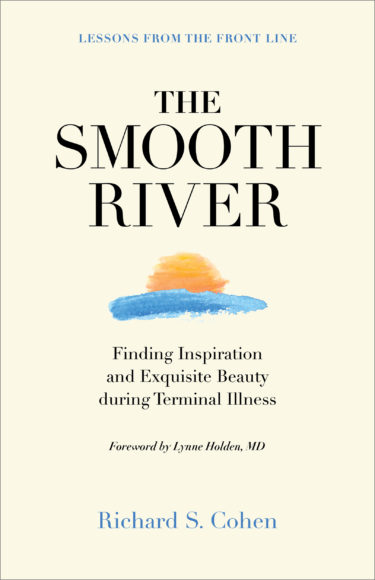On Sept. 3, 2019, the bottom fell out of Richard S. Cohen and Marcia Horowitz’s world. That summer, she had experienced stomach pains and in August had a blood test and a CT scan. On Sept. 3, Cohen met her in a Manhattan coffee shop and together the couple “took that horrid walk you take when the doctor is about to deliver bad news.”
The doctor never looked them in the eye, Cohen says: Horowitz had Stage IV pancreatic cancer.
The third most common cause of death from cancer in the United States, pancreatic cancer kills approximately 48,000 people in the United States and about 430,000 globally each year. As with lung cancer (see Page 46) and ovarian cancer, it is insidious: By the time you experience its symptoms, it has usually metastasized. For those who are diagnosed early, the average survival time is three to three and a half years. (Former Supreme Court Justice Ruth Bader Ginsburg lived for 11 years after being diagnosed with early-stage pancreatic cancer, succumbing to its complications on Sept. 18 of last year at age 87. Mezzo-soprano Marilyn Horne, diagnosed with localized pancreatic cancer in 2005 at age 71, is still with us.) Those with Stage IV pancreatic cancer live on average about a year. (Former “Jeopardy!” host Alex Trebek died on Nov. 8 of last year at age 80 after a 20-month battle with Stage IV pancreatic cancer.)
“For three days, we were in free fall,” says Cohen, a Scarsdale resident who writes about their experience in the new memoir “The Smooth River: Finding Inspiration and Exquisite Beauty During Terminal Illness” (Smooth River Inc.). “On the third day we met with an oncologist and realized we were not alone….We found buoyancy. We remembered who we were.”
Who they were was a high-powered couple. A press aide to former New York City Mayor Abraham Beam, Horowitz spent 41 years at Rubenstein — a public relations and crisis management firm in Manhattan, founded in 1954 by Howard J. Rubenstein, well-known for such high-profiled clients as the late New York Yankees’ owner George M. Steinbrenner and businessman, art collector and Greenwich Polo Club founder Peter M. Brant Sr. Horowitz’s clients ranged from philanthropies and health-care systems to celebrities and CEOs.
“She always found the calm in the storm,” Cohen says, “reducing complicated subject matter to resonate with the press.”
Trained as a corporate lawyer, he is a merger and acquisitions adviser for medical technology companies, based in Tarrytown.
“I, too, needed to create structure,” says Cohen, who took comfort in speaking to others with the disease, including Trebek.
Mostly, though, the couple took their cues from the 67-year-old Horowitz herself. The woman who had smoothed the way for so many “didn’t want to see her life as a tragedy.” They were at a fork in the road.
“One fork, you get subsumed by the circumstances,” Cohen says. “The other brings clarity.”
Choosing clarity, they “hoped for the best but prepared for the worst” — learning everything they could about the disease and developing a medical plan and a life plan.
“The medical plan consisted of a standard of care, chemotherapy treatments and unconventional, investigative drugs under a doctor’s supervision,” he says.
He praises Horowitz’s oncologist, “who treated the entire patient, offering palliative care, including pain management, treating her well-being and making her comfortable.
“Too often, doctors are afraid to discuss the end of life as it makes them think they’ve failed their patients,” Cohen says, echoing one of the themes in Atul Gawande, M.D.’s book “Being Mortal: Medicine and What Matters in the End.”
Good doctors, Cohen adds, treat the whole person, not just the condition, balancing hope and realism as they “gently prepare” terminal patients for the end. Cohen singles out the staff at New-York Presbyterian Weill Cornell Medical Center in Manhattan, which provided her primary care, as well as that of New-York Presbyterian Lawrence Hospital in Bronxville, which addressed Horowitz’s more immediate needs, including chemotherapy, hydration issues and any emergencies.
The couple’s life plan was larger, encompassing the medical plan. They spent time with family, including their two sons, one of whom is married and now has two children. The pair, who had been hosted on a June-July 2019 trip to Israel by a Palestinian woman — “a Ph.D. and mother of four,” Cohen says — established Marcia’s Light Foundation to build bridges between groups, such as Muslim and Jewish students; and supported El Centro Hispano in The Church of St. Bernard in White Plains, which named an early childhood program after them; and Mentoring in Medicine, to help underserved minorities gain access to health-care careers.
“Marcia also loved water,” Cohen says. They bought a fixer-upper near Clearwater, Florida, and took walks on Indian Rocks Beach. Closer to home, the two ambled the Scenic Hudson RiverWalk Park in Tarrytown, located on a stretch of a former asphalt plant overlooking the Hudson River that commands views of the Manhattan skyline and Sleepy Hollow Lighthouse. At Pilla Landing or Pilla Point, they noticed some boulders, and Cohen suggested to Tarrytown officials a bench honoring his wife, which is situated north of the landing in what is now an area for honor benches.
“There are weddings there and incredible sunsets,” Cohen says. “You can see the skyline and a gorgeous lighthouse to the north.”
Because Horowitz did not want to turn their home into a hospital, they made few adjustments to it, he says, adding a chairlift, grab bars and a walker. With the exception of four days when they had home health aides, Cohen, who kept working part time, cared for his wife himself, even learning to do her hair.
They tied up loose legal and familial ends. “We left no stone unturned,” Cohen says. And that included talking about cancer and death. At first, he says he wanted to avoid this. But then he remembered a quote from Fred (Mr.) Rogers: “Anything that’s human is mentionable, and anything that is mentionable can be more manageable.”
“I had to become a better listener,” Cohen says. “So, for one hour every afternoon in our sun room, we talked about everything she wanted to talk about. That freed Marcia up to talk to friends, to watch Netflix.”
They had planned on Horowitz passing at home. But pancreatic cancer brings extremely low blood pressure, fainting, internal bleeding, the need for transfusions and the inability to hold food down. At Lawrence Hospital, she was admitted to Room 413, which became a place of low lights, Broadway music and family visits, with Cohen sleeping on a futon. When he woke on the morning of Feb. 10 last year, Horowitz wasn’t responding — which wasn’t that unusual. But then the nurse checked her and there were no vital signs.
“It was organic, natural,” he says. “She looked like she was sleeping.”
After her passing, Cohen took advantage of Cancercare’s free counseling and bereavement services. He visits the bench near Pilla Landing and her grave at Sharon Gardens in Valhalla.
“I realized this is her home now.”
Sharon Gardens is a place where he can cry and retreat when life seems cloudy.
“But I leave clear-eyed,” he says. “She’s still advising me. It helps me keep the big picture.”
For more, visit smoothriver.org.







